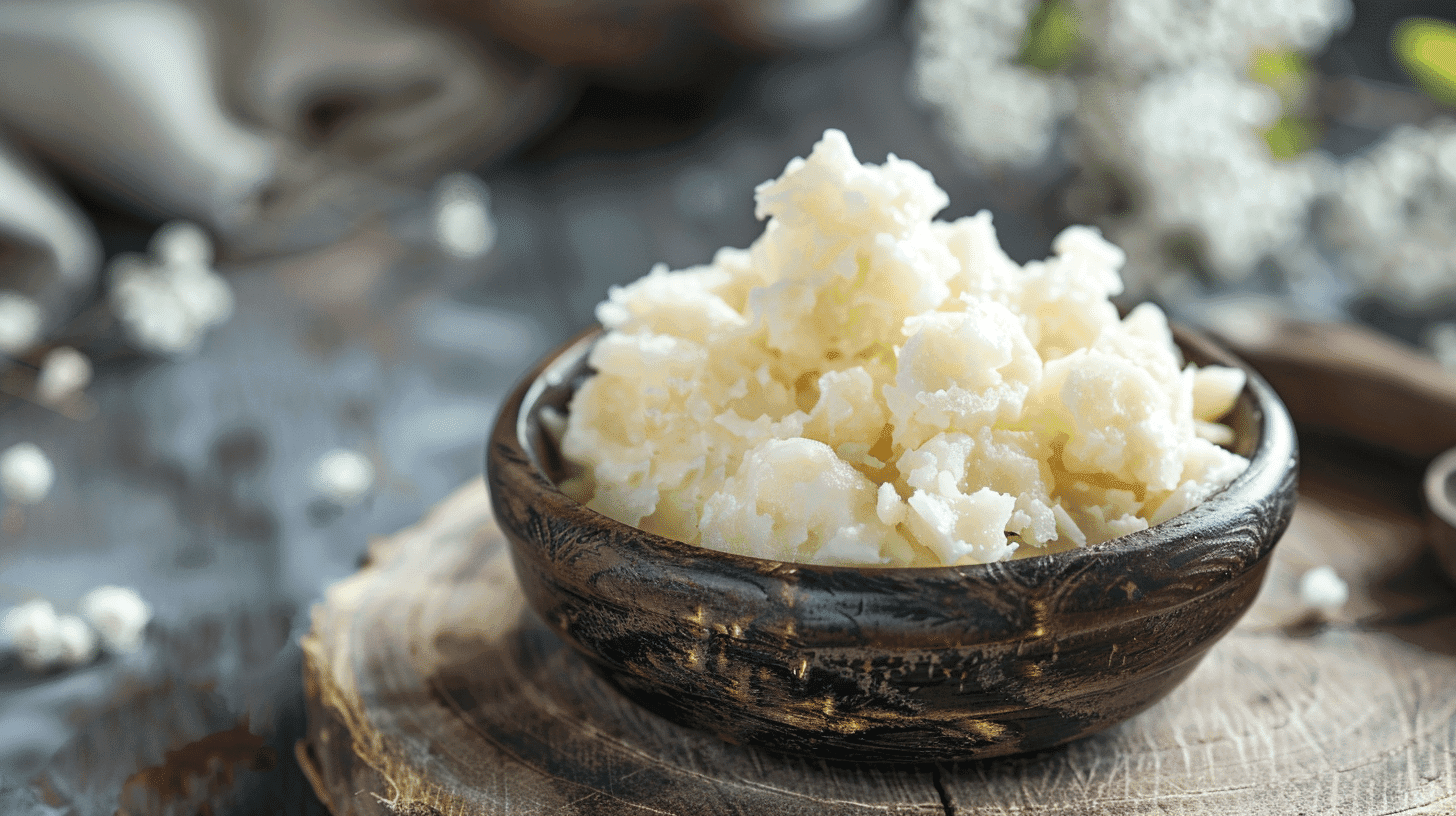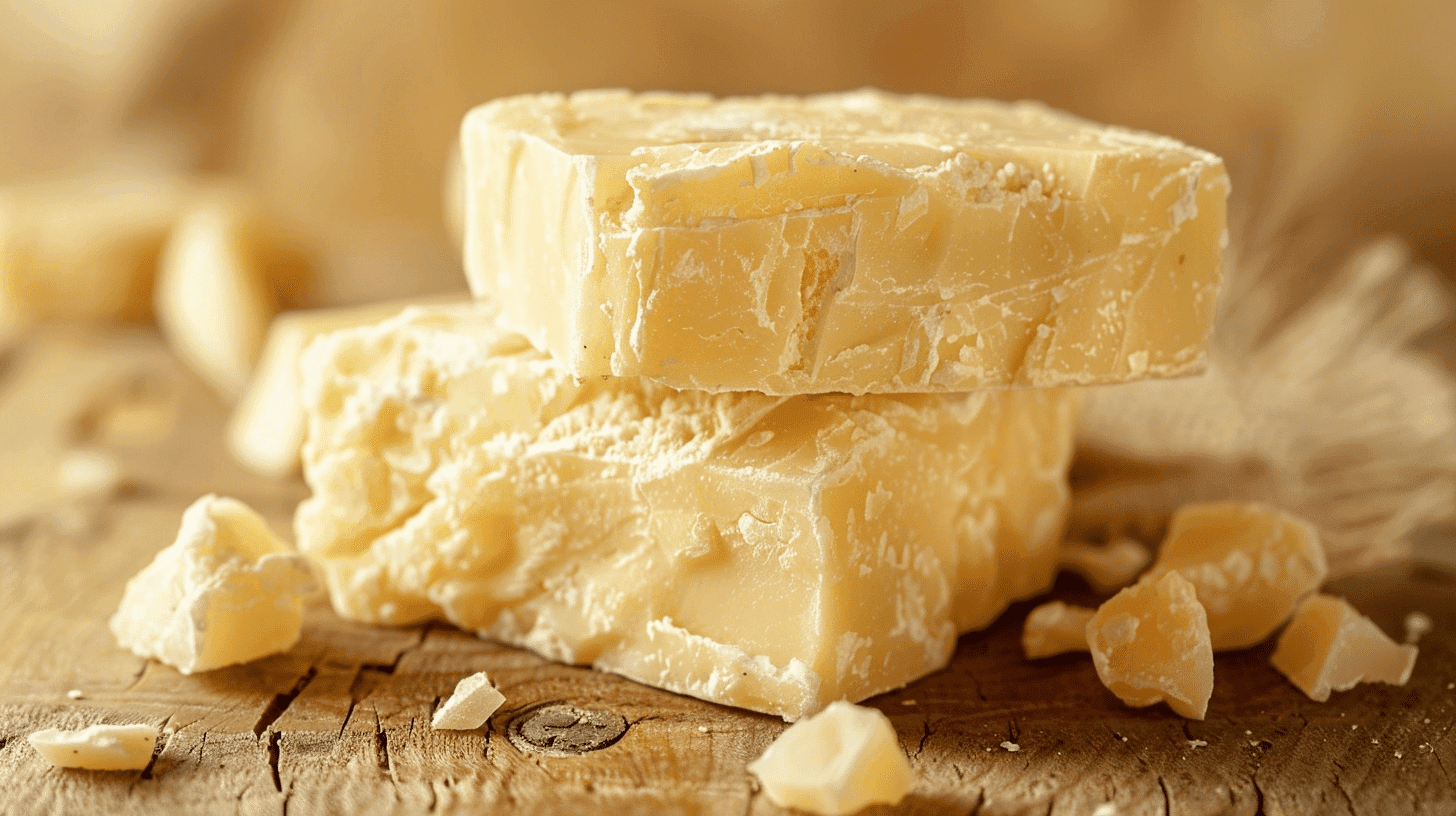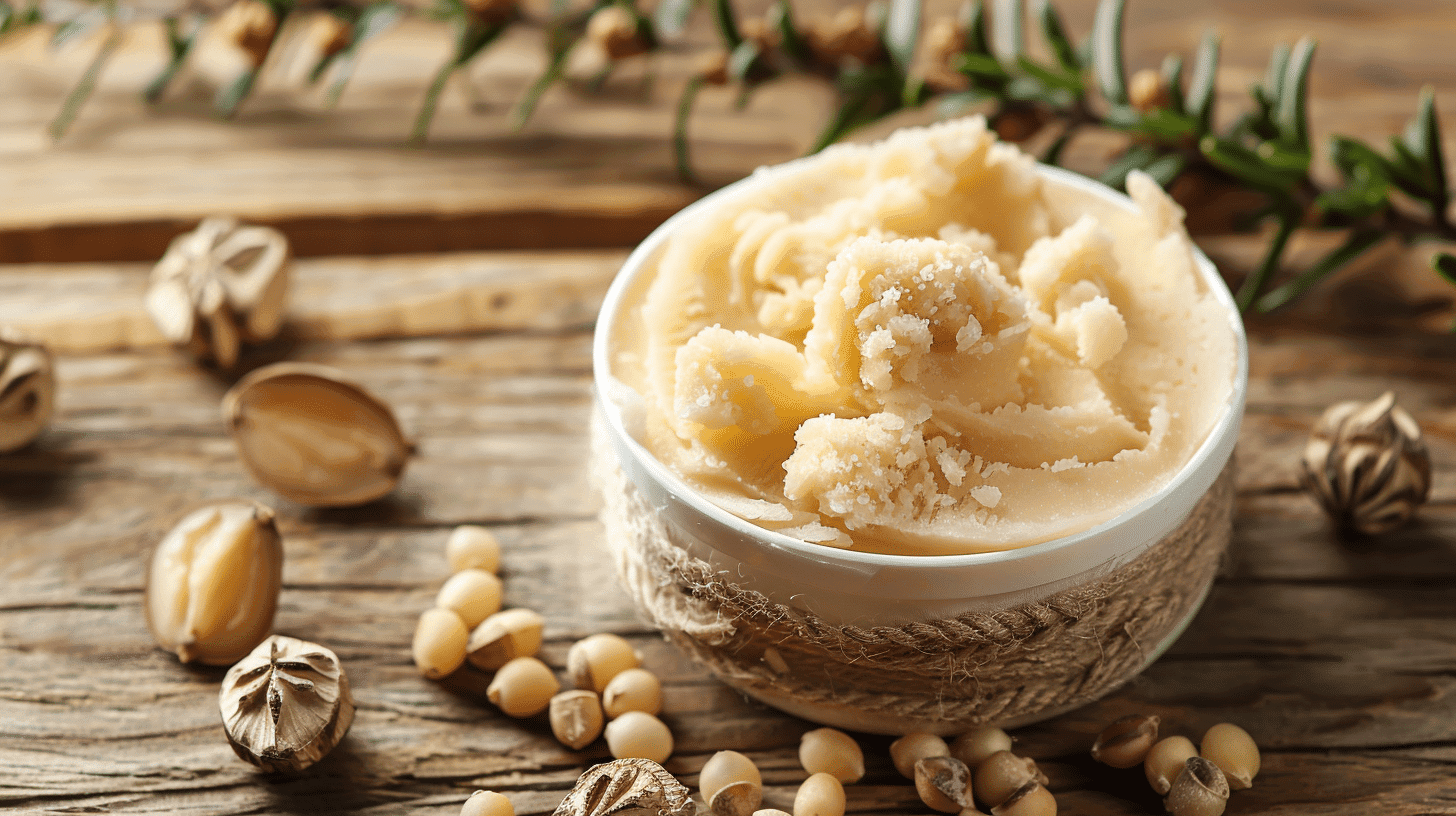Are you tired of dealing with the redness, itchiness, and discomfort caused by eczema? What if there was a natural remedy that could provide relief and restore your skin’s health? Look no further than shea butter.
Shea butter has been used for centuries for its healing properties and skincare benefits. But what makes it so effective in treating eczema? How does it soothe the skin and alleviate the symptoms? And how can you incorporate it into your daily routine to experience maximum results?
In this article, we will explore the power of shea butter in eczema management. From its moisturizing and anti-inflammatory properties to its ability to relieve itching and inflammation, we will uncover why shea butter is your new best friend in the battle against eczema.
Key Takeaways:
- Shea butter is a natural remedy for eczema that provides relief and restores skin health.
- It has moisturizing and anti-inflammatory properties, making it effective in managing eczema symptoms.
- Organic shea butter is the best choice for eczema-prone skin due to its purity and quality.
- Shea butter can soothe itching, reduce inflammation, nourish the skin, and promote healing.
- By incorporating shea butter into your skincare routine and complementing it with other natural remedies, you can effectively manage eczema and promote healthier, happier skin.

Understanding Eczema and its Impact on the Skin
Eczema is a chronic skin condition that affects millions of people worldwide. It is characterized by red, itchy, and inflamed patches of skin that can be both painful and uncomfortable. Understanding eczema and its impact on the skin is crucial in finding effective relief and treatment options.
Eczema Relief Products and Natural Eczema Treatment
Common Symptoms of Eczema:
- Intense itching
- Dry and flaky skin
- Redness and inflammation
- Rough and scaly patches
- Small raised bumps
“Living with eczema can be challenging, both physically and emotionally. The constant itchiness and discomfort can significantly impact your quality of life.”
Individuals with eczema often face challenges such as sleep disturbances, decreased self-esteem, and a higher risk of skin infections. Therefore, finding effective and natural treatments for eczema relief is essential.
Table: Comparison of Eczema Relief Products
| Eczema Relief Products | Key Features | Benefits |
|---|---|---|
| Shea Butter | Rich in moisturizing and anti-inflammatory properties | Provides deep hydration and soothes inflamed skin |
| Oatmeal-based creams | Calms itching and reduces redness | Forms a protective layer on the skin and helps retain moisture |
| Coconut oil | Hydrates and nourishes dry skin | Reduces inflammation and itching |
While there are several eczema relief products available on the market, it’s important to choose natural treatments that provide long-term benefits without harmful chemicals or side effects. Shea butter, oatmeal-based creams, and coconut oil are popular choices due to their effectiveness and gentle nature.
Why Choose Natural Eczema Treatment?
Natural eczema treatments, such as shea butter, offer multiple benefits:
- Gentle on the skin: Natural ingredients are less likely to cause irritation or adverse reactions.
- Moisturizing properties: Natural oils and butters deeply hydrate the skin, reducing dryness and flakiness.
- Anti-inflammatory effects: Natural remedies help soothe inflammation, relieving itching and discomfort.
By opting for natural eczema treatment, you can address the root causes of the condition and promote healthier, happier skin.

Unveiling the Power of Shea Butter in Eczema Management
Shea butter is a natural wonder that holds immense potential for managing eczema. Its rich composition and numerous benefits make it a popular choice for those seeking relief from this skin condition. Let’s explore the specific ways in which shea butter can help in eczema management.
The Moisturizing Properties of Shea Butter
One of the key benefits of shea butter is its exceptional moisturizing abilities. Its high concentration of fatty acids, including oleic, stearic, and linoleic acids, nourishes the skin and locks in moisture.
“Shea butter deeply moisturizes the skin, relieving dryness and preventing further irritation.”
This deep hydration helps to soothe the dry and flaky skin commonly associated with eczema. Regular use of shea butter can improve the skin’s natural moisture barrier, reducing the risk of moisture loss and enhancing overall skin health.
The Anti-Inflammatory Effects of Shea Butter
Shea butter also possesses powerful anti-inflammatory properties that can help alleviate the redness, itching, and inflammation caused by eczema. It contains several bioactive compounds, such as cinnamic acid and lupeol, which have been found to have anti-inflammatory effects.
By reducing inflammation in the skin, shea butter helps to calm the symptoms of eczema and promote healing.
Why Choose Organic Shea Butter for Eczema-Prone Skin?
When it comes to choosing shea butter for eczema management, opting for organic varieties is highly recommended. Organic shea butter is produced without the use of harmful pesticides, chemicals, or genetically modified organisms (GMOs).
This ensures that the shea butter is of the highest quality and free from potential irritants that could cause further inflammation or aggravate eczema symptoms.
| Benefits of Organic Shea Butter for Eczema | Why It’s Important |
|---|---|
| Natural healing properties | Reduced risk of skin irritation |
| Rich in vitamins and antioxidants | Promotes skin health and repair |
| Free from harmful chemicals | Avoids potential triggers for eczema flare-ups |
By choosing organic shea butter, you can ensure that you’re providing your skin with the gentle care and nourishment it needs without any added toxins or allergens.
Next, we will explore how shea butter relieves itching and inflammation, diving deeper into its mechanisms and scientific evidence for its effectiveness in managing eczema.

How Shea Butter Relieves Itching and Inflammation
Shea butter, renowned for its exceptional moisturizing properties, provides much-needed relief from itching and inflammation caused by eczema. This natural ingredient is a game-changer in eczema management, offering a soothing and calming effect on irritated skin. Let’s explore how shea butter works its magic and brings comfort to those struggling with eczema.
Healing Properties of Shea Butter
Shea butter boasts an impressive range of healing properties that make it a valuable asset in the fight against eczema. Its rich composition includes essential fatty acids, vitamins A and E, and antioxidants, all of which contribute to its remarkable healing capabilities. These components work synergistically to nourish and repair the skin, effectively alleviating eczema symptoms.
“Shea butter is a versatile ingredient that provides deep hydration to dry and damaged skin. Its anti-inflammatory and emollient properties make it an excellent choice for soothing eczema-prone skin.”
Notably, shea butter’s anti-inflammatory properties play a key role in reducing itching and inflammation associated with eczema. Studies have shown that shea butter effectively inhibits the production of pro-inflammatory substances in the skin, helping to calm the redness and irritation caused by eczema flare-ups.
In addition, shea butter’s moisturizing properties create a protective barrier on the skin’s surface, preventing moisture loss and enhancing skin hydration. This is particularly beneficial for individuals with eczema, as dryness is a common characteristic of this condition. By keeping the skin hydrated, shea butter helps relieve itching, soothe irritation, and promote healthier skin.
Scientific Evidence Supporting Shea Butter as an Eczema Remedy
The healing potential of shea butter has been extensively studied and validated by scientific research. Various studies have demonstrated the effectiveness of shea butter in relieving eczema symptoms and improving overall skin health.
“A clinical study conducted on individuals with mild to moderate eczema found that a topical formulation containing shea butter significantly reduced itching and improved skin hydration.”
Another study investigated the anti-inflammatory properties of shea butter and its ability to reduce itch-related behaviors in a mouse model of eczema. The findings showed a significant decrease in scratching and inflammatory markers, supporting the use of shea butter as a natural remedy for eczema relief.
These scientific findings solidify the position of shea butter as a trusted and effective treatment option for eczema sufferers. With its proven anti-inflammatory and moisturizing properties, shea butter offers a natural alternative to conventional eczema remedies.
Next, we will explore the nourishing and healing properties of shea butter in greater detail, discovering how it promotes skin regeneration and helps repair damaged skin barriers.
Nourishing and Healing Properties of Shea Butter
Shea butter is not just any ordinary moisturizer. It possesses unique nourishing and healing properties that make it a perfect natural remedy for various skin conditions, including eczema. Rich in vitamins A, E, and F, as well as essential fatty acids, shea butter provides the skin with the nutrients it needs to thrive and heal.
One of the key benefits of shea butter is its ability to promote skin regeneration. When applied to the skin, it stimulates the production of collagen, a protein essential for maintaining skin elasticity and youthful appearance. This process helps repair damaged skin barriers, improving the overall condition and texture of the skin.
“Shea butter has been used for centuries in Africa for its remarkable healing properties.”
In addition, shea butter has exceptional moisturizing capabilities, which are particularly beneficial for individuals with dry and flaky eczema-prone skin. It penetrates deeply into the skin, locking in moisture and preventing dehydration. Its emollient nature helps soothe and nourish the skin, relieving discomfort and reducing the appearance of dry patches.
Not only does shea butter heal and moisturize, but it also possesses anti-inflammatory properties. The cinnamic acid found in shea butter reduces inflammation and calms irritated skin, providing relief from itching and redness associated with eczema. This soothing effect helps promote a healthier skin barrier and minimizes the risk of further irritation.
When choosing shea butter for eczema relief, opt for organic and unrefined varieties. These types are minimally processed, ensuring the preservation of the butter’s natural nutrients and therapeutic properties. Look for trusted brands that prioritize sustainability and fair trade practices in sourcing their shea butter.

Comparing Shea Butter Varieties:
| Shea Butter Type | Processing Method | Benefits |
|---|---|---|
| Unrefined Shea Butter | Minimally processed, retains natural nutrients and healing properties | Deep moisturization, promotes skin regeneration, reduces inflammation |
| Refined Shea Butter | Thoroughly processed, some nutrients and healing properties may be lost | Moisturization, but limited skin regeneration and anti-inflammatory benefits |
By incorporating shea butter into your skincare routine, you can harness its nourishing and healing properties to effectively manage eczema and promote healthy skin. Whether used as a standalone treatment or in combination with other natural remedies, shea butter offers a gentle and non-toxic approach to eczema relief.
Choosing the Right Shea Butter for Eczema Relief
When it comes to finding the best shea butter for eczema relief, it’s essential to consider factors such as quality, purity, and sourcing. By selecting the right product, you can ensure maximum effectiveness in managing your eczema symptoms and promoting healthier skin.
Here are some tips to help you choose the best shea butter:
- Look for organic shea butter: Opt for products that are certified organic to ensure that you are using a pure and natural form of shea butter. Organic shea butter is free from harmful chemicals and additives that could potentially irritate your eczema-prone skin.
- Check the sourcing: Choose shea butter that is sourced from reputable suppliers who use sustainable and fair trade practices. This ensures that the shea butter is harvested ethically and provides support to communities involved in its production.
- Read customer reviews: Before making a purchase, take the time to read customer reviews and testimonials. This will give you an idea of the quality and effectiveness of the shea butter product you are considering.
- Consider additional ingredients: Some shea butter products may be infused with other beneficial ingredients like essential oils, vitamin E, or aloe vera. These additional ingredients can enhance the moisturizing and healing properties of shea butter, providing extra relief for your eczema.
Below are some trusted brands that offer high-quality and organic shea butter for eczema relief:
| Brand | Description |
|---|---|
| Cotton Candy | This shea butter body butter is a fun sweet and sugary scent, and other natural ingredients! |
| Pineapple & Papaya | This body butter is made with mango and shea butter for maximum hydration. |
| Men’s Body Butter | Keep your skin healthy and comfortable with an easy body butter made just for men! |
Remember, choosing the right shea butter for eczema relief is crucial for optimal results. Take the time to research and select a product that aligns with your values and meets your specific needs. With the right shea butter, you can effectively manage your eczema symptoms and improve the overall health of your skin.
Incorporating Shea Butter into Your Skincare Routine
Shea butter is a versatile and beneficial ingredient to include in your daily skincare routine. Its natural properties make it an excellent choice for nourishing and healing the skin, making it particularly effective for individuals with eczema. Below are some practical tips on how to incorporate shea butter into your skincare regimen:
- Moisturizers: Add shea butter to your favorite moisturizer to enhance its hydrating properties. Simply mix a small amount of shea butter with your moisturizer and apply it to your skin as you normally would. This will help lock in moisture and provide long-lasting hydration, leaving your skin soft and supple.
- Balms: Create your own shea butter balm by melting a small amount of shea butter in a double boiler and adding in other beneficial ingredients like coconut oil or essential oils. Allow the mixture to cool and solidify, then apply it to areas of dry or irritated skin. The balm will provide intense moisturization and relieve itchiness and inflammation.
- Homemade remedies: Combine shea butter with other soothing ingredients to create homemade remedies for eczema relief. For example, you can mix shea butter with aloe vera gel and lavender essential oil to soothe irritated skin and promote healing. Experiment with different combinations to find the one that works best for you.
To get the most out of your shea butter skincare routine, it’s important to apply it correctly. Here are some tips for the best application techniques:
- Warm up the shea butter between your palms before applying it to your skin. This will help it melt and spread more easily.
- Gently massage the shea butter into your skin using circular motions. This will promote better absorption and allow the butter to penetrate deeper into the skin layers.
- Apply shea butter immediately after showering or bathing to lock in moisture and maximize its benefits.
- Use shea butter as often as needed throughout the day, especially during eczema flare-ups or when your skin feels dry and irritated.
By incorporating shea butter into your skincare routine and exploring different ways to use it, you can harness its healing properties and experience the benefits it offers for your skin. Whether you opt for moisturizers, balms, or homemade remedies, shea butter can be a game-changer in managing eczema and promoting overall skin health.

Other Natural Remedies to Complement Shea Butter for Eczema Relief
While shea butter is a powerful natural remedy for eczema, there are other ingredients that can work in synergy with it to provide even greater relief. Here, we will explore some additional natural remedies that can complement the use of shea butter and enhance your eczema treatment.
- Coconut Oil: Coconut oil is known for its moisturizing properties and can help soothe dry and itchy skin. Its antimicrobial properties may also help prevent secondary infections caused by scratching.
- Oatmeal: Oatmeal is a soothing ingredient that can reduce inflammation and relieve itching. It forms a protective barrier on the skin, helping to lock in moisture and promote healing.
- Chamomile: Chamomile is a calming herb that has anti-inflammatory and antibacterial properties. It can help reduce redness, itching, and irritation associated with eczema.
When combined with shea butter, these natural remedies can provide a multi-faceted approach to eczema relief. By targeting different aspects of the condition, they work together to alleviate symptoms and promote healthier skin.
Remember, it’s always important to consult with a dermatologist or healthcare professional before trying any new remedies or treatments, especially if you have any underlying medical conditions or are allergic to certain ingredients.
Tips for Managing Eczema Flare-Ups and Prevention
Managing eczema flare-ups and preventing recurrent episodes can be a challenging task. However, with a few practical tips and strategies, you can take control of your eczema and support your skin health. Here are some recommendations to help you on your journey:
1. Moisturize regularly: Keeping your skin well-hydrated is crucial for managing eczema. Apply a natural moisturizer, such as shea butter, after bathing to lock in moisture and prevent dryness.
2. Avoid irritants: Identify and avoid potential triggers that worsen your eczema symptoms. These may include certain fabrics, harsh soaps, fragrances, or environmental factors like extreme temperatures or allergens.
3. Practice stress management: Stress can aggravate eczema flare-ups. Find healthy coping mechanisms such as meditation, deep breathing exercises, or engaging in activities you enjoy to help reduce stress levels.
4. Maintain a healthy diet: Consuming a balanced diet rich in fruits, vegetables, and omega-3 fatty acids can support your skin’s health and reduce inflammation. Avoiding processed foods, sugar, and potential allergens can also help manage eczema.
5. Protect your skin: Shield your skin from irritants and allergens by wearing loose-fitting, breathable clothing made of natural fibers like cotton. Use gloves when handling harsh cleaning products or chemicals.
6. Establish a skincare routine: Develop a consistent skincare routine that includes gentle cleansing, moisturizing, and targeted treatments. Using products specifically formulated for eczema-prone skin can help alleviate symptoms and promote healing.
7. Keep nails short: To prevent scratching and further irritation, maintain short nails to minimize damage to the skin during eczema flare-ups.
8. Seek professional advice: If your eczema symptoms persist or worsen despite self-care efforts, consult a dermatologist for personalized recommendations and medical treatments.
By implementing these tips and integrating shea butter and other natural remedies into your daily routine, you can effectively manage your eczema, reduce flare-ups, and promote healthier skin. Remember, every individual’s eczema journey is unique, so find what works best for you and prioritize self-care.

Conclusion
In conclusion, shea butter is a natural and effective remedy for eczema relief. Its healing properties and soothing effects on the skin make it an ideal choice for those seeking a natural alternative to conventional treatments. Incorporating shea butter into your skincare routine can help manage eczema symptoms and promote healthier skin.
With its moisturizing and anti-inflammatory properties, shea butter provides much-needed relief from the itching, inflammation, and dryness associated with eczema. It nourishes the skin, repairs damaged skin barriers, and helps to restore the skin’s natural moisture balance.
When choosing shea butter products, opt for organic and high-quality options to ensure maximum effectiveness. Look for reputable brands that prioritize sustainability and ethical sourcing practices. By combining shea butter with other natural remedies, such as coconut oil or oatmeal, you can enhance its benefits and further alleviate eczema symptoms.
Discover the power of shea butter for eczema relief and experience the difference it can make in your skincare routine. Embrace the healing properties of this natural ingredient and say goodbye to the discomfort of eczema, welcoming healthier and happier skin.

Leave a Comment